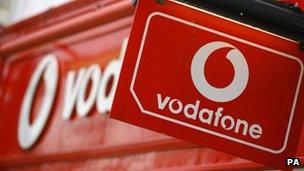Vodafone, C&WW, and a £5bn tax question
- Published
- comments

If Vodafone acquired C&WW would its UK tax bill be reduced?
A behind-the-scenes battle to acquire Cable & Wireless Worldwide, owner of one of the UK's largest fibre-optic cable networks, is coming to a head.
By teatime on Thursday at the latest, and probably earlier, we should learn whether the board of C&WW, has chosen Vodafone or India's Tata Communications as its new owner.
So what?
A big multinational will buy a medium-sized telecoms company, that specialises in serving businesses, for around £1bn. Aside from the conspicuous fact that takeovers of any size are few and far between at the moment, there is nothing remarkable in that.
However, this deal is of interest in the context of the explosive public debate - fuelled by the government - about whether big companies and wealthy individuals are paying their fair share of tax.
Because what is striking about Cable & Wireless is that it pays very little tax thanks largely to massive capital allowances it generated in constructing its telecoms network.
In its last annual results, C&WW enjoyed a tax credit of £69m and the group said it expected the "current" tax charge to be less than £5m a year "for the foreseeable future". More strikingly, perhaps, the notes to its accounts show a £5.2bn UK "capital loss" - which in theory is permanently available to reduce the tax payable on UK profits.
Now I asked Cable & Wireless whether this so-called "unrecognised deferred tax asset" of more than £5bn would be available to reduce the tax bill of whoever buys the company. The company said the answer was yes, so long as the acquirer is "making profits in the UK telecoms space".
So there is an opportunity for both Tata Communications and Vodafone to reduce their UK bill for corporation tax by buying Cable & Wireless.
Except, of course, there is a huge difference between Tata Communications and Vodafone, which is that Tata currently has no operations in the UK and Vodafone is massive here: last year its UK earnings before interest, tax, depreciation and amortisation (a proxy for its cash flow) were £1.2bn.
So I asked Vodafone whether one of the reasons it wanted to buy C&WW was to cut its UK tax bill for the next few years.
Here's the thing: the Vodafone official to whom I spoke said he wasn't allowed to say anything about the bid for C&WW, because of new severe strictures imposed by the regulator of takeovers, the Takeover Panel.
Which seems to me to be a bit odd, but there you are. So I have to rely on what anonymous sources close to Vodafone are saying to me. And one of the problems is that those sources are saying contradictory things.
One source says that Vodafone is not certain it would be able to exploit the £5bn unrecognised tax asset, and that it wants C&WW primarily for its 20,500km of fibre-optic cables in the UK and 6,000 business customers.
But another source says the board of Vodafone is acutely conscious that there are tax advantages from the proposed takeover - and the directors are aware that this may cause some controversy.
This is a particularly resonant issue for Vodafone because of its long-running dispute with Her Majesty's Revenue and Customs about how much it owed under the Controlled Foreign Companies rules, which was eventually settled in 2010 when Vodafone agreed to pay £1.25bn. Some MPs on the Public Accounts Committee questioned whether HMRC had let Vodafone off lightly.
Also City analysts have identified Vodafone as a multinational company that succeeds in keeping its worldwide tax bill well below the UK corporation tax rate: in 2010-11, the £1.6bn of "income tax expense" paid by Vodafone represented an implicit tax rate of 17%, compared with the 28% prevailing in the UK at the time.
All of which probably means that if Vodafone ends up as the winner of the auction of C&WW, it will probably need to break its vow of silence and state whether the deal would indeed allow it to slash the tax it pays here.